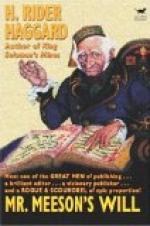“Stays!” said Mr. Meeson, desperately. “Forgive me for mentioning them, but surely you put on your stays? One could write on them, you know.”
“I am very sorry, Mr. Meeson,” she answered, “but I did not put any on.”
“Not a cuff or a collar?” he said, catching at a last straw of hope.
Augusta shook her head sadly.
“Then there is an end of it!” groaned Mr. Meeson. “Eustace must lose the money. Poor lad! poor lad! I have behaved very badly to him.”
Augusta stood still, racking her brain for some expedient, for she was determined that Eustace Meeson should not lose the chance of that colossal fortune if she could help it. It was but a poor chance at the best, for Mr. Meeson might not be dying, after all. And if he did die, it was probable that his fate would be their fate also, and no record would remain of them or of Mr. Meeson’s testamentary wishes. As things looked at present, there was every prospect of their all perishing miserably on that desolate shore.
Just then the sailor Bill, who had been up to the flagstaff on the rock on the chance of catching sight of some passing vessel, came walking past. His flannel shirt-sleeves were rolled up to the elbows of his brawny arms, and as he stopped to speak to Augusta she noticed something that made her start, and gave her an idea.
“There ain’t nothing to be seen,” said the man, roughly; “and it is my belief that there won’t be neither. Here we are, and here we stops till we dies and rots.”
“Ah, I hope not,” said Augusta. “By-the-way, Mr. Bill, will you let me look at the tattoo on your arm?”
“Certainly, Miss,” said Bill, with alacrity, holding his great arm within an inch of her nose. It was covered with various tattoos: flags, ships, and what not, in the middle of which, written in small letters along the side of the forearm, was the sailor’s name—Bill Jones.
“Who did it, Mr. Bill?” asked Augusta.
“Who did it? Why I did it myself. A chap made me a bet that I could not tattoo my own name on my own arm, so I showed him; and a poor sort of hand I should have been at tattooing if I could not.”
Augusta said no more till Bill had gone on, then she spoke.
“Now, Mr. Meeson, do you see how you can make your will?” she said quietly.
“See? No.” he answered, “I don’t.”
“Well, I do: you can tattoo it—or, rather get the sailor to tattoo it. It need not be very long.”
“Tattoo it! What on, and what with?” he asked, astonished.
“You can have it tattooed on the back of the other sailor, Johnnie, if he will allow you; and as for material, you have some revolver cartridges; if the gunpowder is mixed with water, it would do, I should think.”
“’Pon my word,” said Mr. Meeson, “you are a wonderful woman! Whoever would have thought of such a thing except a woman? Go and ask the man Johnnie, there’s a good girl, if he would mind my will being tattooed upon his back.”




